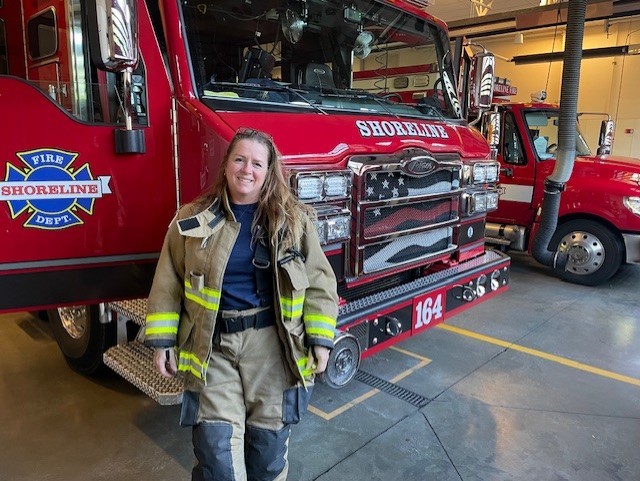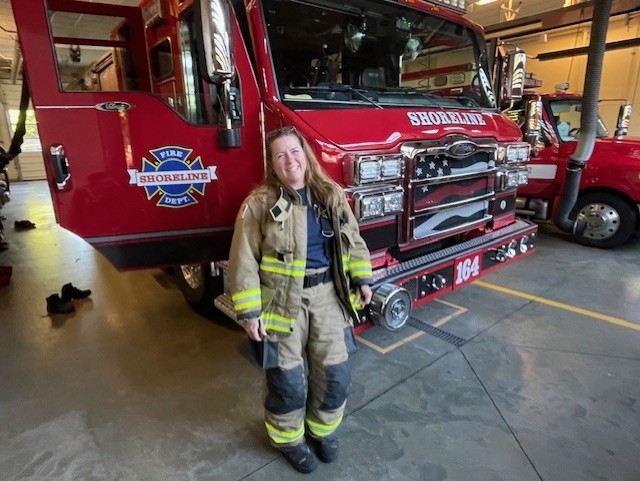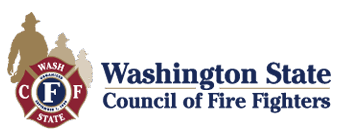
What does a survivor mean?
My name is Michelle Pidduck and even though I’m from California, Washington State has been my home for the last 26+ years. I have been with the Shoreline Fire Department for the last 22 years. My current position is Public Information and Education Officer. However, I am still a Firefighter/EMT, as well as CPR Coordinator. I’m in Local 1760 Shoreline, on the Wellness Committee, and a Peer Fitness Trainer. I’m also a fire commissioner for Big Lake Fire – Skagit. It’s an amazing volunteer department.
I actually moved to this state for my prior career as a Strength and Conditioning Coach for the University of Washington. While in college, I was a Wildland Firefighter in the summers, that gave me the “bug” of wanting to do more. Because I did my undergraduate and graduate work in a different field, I decided to continue toward a career in athletics, coaching. However, “the bug” didn’t go away. So, I felt called to go to a “needed” career rather than a “wanted” career.
About my cancer journey-
I, like my other co-workers, get a yearly physical. In 2022, I was due for mine in November. However, I felt a tug to get one sooner. I got my appointment in August. One of our doctors, Dr. Gary Schuster, who does our specific physical, is highly regarded. He has caught many major health issues for quite a few of us. One of the areas he previously worked in was breast cancer research.
He palped two lumps… Off to a mammogram and MRI at Fred Hutch Cancer Center.
They said, “You need to buy him dinner, as we can’t palpate any.” The mammogram showed four, and the MRI showed two more.
The diagnosis phone call came while I was at work…
Breast Cancer…
We know the fire service is a family. I was sharing an office and my coworker was amazing support as I “lost it!” All that went through my mind was my husband and daughters. I had no signs or family history. My next thought was: let’s take care of this NOW.
The waiting period was brutal. The lumps were all in the left breast but stated the lymph nodes were clear. Surgery was scheduled for October. Once they were doing the 6 [CA1] lumpectomy, they then found cancer in two lymph nodes. After surgery, chemo started a little over a month later.
“You shouldn’t start losing your hair ‘til maybe after the second round…” First round, my long, straight hair started coming out in clumps. This was one of the hardest parts for my daughters, seeing me change so quickly. So: six rounds of chemo, a month off, then five times per week for a month of radiation, commuting from Mount Vernon (1.5 hours each way) for a 20-minute appointment, then infusions every three weeks for the rest of the year (2023).
I am now “cancer free” and can finally put my now dark and curly hair back in a ponytail, as of August 2025. I worked throughout my cancer with reduced hours. I have check-ups with mammograms or MRIs every few months to make sure it hasn’t returned. I don’t know if you ever feel “cancer free.”
In what ways did your fire service family and colleagues support you during this time, and what did that support mean to you?
Just prior to getting my diagnosis, we had gutted our master bathroom down to studs as well as some of our bedroom. We also had moved from Shoreline to Mount Vernon a year and a half prior: five acres to take care of. Needless to say, my husband denied any help for the first nine months. Then, my awesome union brothers and sisters talked him into it. We had one of my “brothers” complete part of our project. Another day, 25-plus came on their day off with all their landscaping and yard work equipment. From early morning ‘til late afternoon on one of the hot, hot days, they worked their butts off. We had two dump trailers filling, with hubby taking them alternately to the dump. That was the most humbling and relieving experience. True family!
My husband was/is such a rockstar. He was taking care of me, our daughters, and trying to hold down the fort! This alleviated my stress for him. Our union is amazing! They also knew I wanted to switch to more organic products and bought me gift cards to our local co-op. But wait- there’s more. They gave funds to help finish some of our projects, as we were depleting our savings trying to make it doable during cancer treatments. AMAZING!
During the most difficult moments, what helped you stay strong, hopeful, or motivated?
During the most difficult moments, my faith and family kept me strong. My “verse” was/is: I can do all things through Him who strengthens me (Philippians 4:13). I think being a mom played a huge role. I tried to do as much “normal” as possible to alleviate their fears. Exhausting, but keeping that positive attitude on the outside – and also on the inside – was key. Also, knowing other firefighters were going through it and fighting the fight was motivating!
How has your experience with breast cancer influenced your perspective on life, your work, or your role in the fire service?
My perspective on life is the same: it’s a gift. For work, I still love the job and would do it all over again. I would not have had the early mentality that smoke- and carcinogen-filled gear looked tough. Now, in every class I teach, I educate. I share my story to encourage others to be proactive and do regular checks, as that was key for early detection and a greater chance of beating it!
I am so thankful for the WSCFF Cancer Foundation, especially Eric Monroe. He made it such an easy experience to get support and education. You never feel alone on an island fighting this. It is key to talk to others who have dealt with cancer on a personal level.
THANK YOU ALL!

____
Michelle’s story is a powerful reminder of the importance of early detection and community support. We’re incredibly grateful for her openness and encourage members and their families to stay vigilant, get tested, and turn to the WSCFF Cancer Foundation whenever they need guidance or help for themselves or their loved ones.
The WSCFF Cancer Foundation
The WSCFF Cancer Foundation provides essential cancer support and resources to members of the fire service and their families.
On the importance of preventative education, the Foundation’s Director Eric Monroe explains: “We provide educational instruction and resources to raise awareness of the problem, discuss research findings, and provide best practices to minimize exposures to carcinogens known to be linked to our cancer problem.”
When someone is first diagnosed with cancer, the WSCFF Cancer Foundation helps them navigate the overwhelming process. “A cancer diagnosis can be overwhelming, creating a lot of questions. In full confidentiality, we provide tools, resources and references to help people create a plan for their journey, so they don’t have to do it themselves. We can provide a mentor who has been through a similar cancer diagnosis and is willing to share their experiences and lessons learned so the newly-diagnosed individual can make educated decisions for their circumstances.
We provide support to members of the fire service when they or their immediate family gets a cancer diagnosis, because when someone is diagnosed with cancer, it affects the whole family.”
For those seeking guidance or information, Eric reassures:
“Newly diagnosed people can confidentially request assistance and find links to many of our resources we discuss with them on our website. Members researching fire service cancer can find educational resources for their department, plus learn about our organization, and how to get involved.”
A reminder that every interaction is confidential:
“I do not discuss interactions. We want everyone who reaches out for help to know that we will not discuss or share their request for assistance with others.”
For more information on the WSCFF Cancer Foundation, visit wscffcancer.org.
[CA1]Unclear if this is a typo or if it’s the 6th lumpectomy, will confirm
